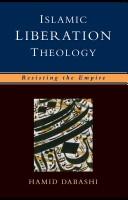| Listing 1 - 5 of 5 |
Sort by
|

ISBN: 0700712372 9780203823101 0203823109 9780700712373 1136769595 9781136769597 9781136769542 9781136769580 9780415591393 1136769587 Year: 2003 Publisher: London : RoutledgeCurzon,
Abstract | Keywords | Export | Availability | Bookmark
 Loading...
Loading...Choose an application
- Reference Manager
- EndNote
- RefWorks (Direct export to RefWorks)
There are two main trends distinguishable amongst Muslim reformists - revivalists and modernists. This book charts and analyses the main trends of Muslim reformist political thought in Bukhara. It is the first to utilize original sources preserved in Soviet archives that were previously inaccessible to western scholars. The author has translated numerous original documents from Tajiki and Russian into English. This book thus serves as a useful resource for students of Islam, Central Asia, the former Soviet Union, and of law, politics and philosophy.
Islam and politics. --- Islamic renewal. --- Islam et politique --- Renouveau islamique --- Islamic countries --- Pays musulmans --- Politics and government. --- Politique et gouvernement --- Islam --- Islamic reform --- Islamic revivalism --- Islamic revivalist movement --- Ṣaḥwah (Islam) --- Religious awakening --- Wahhābīyah --- Politics and Islam --- Political science --- Reform --- Renewal --- Political aspects
Book
ISBN: 9780415779807 9780203855294 0203855299 0415779804 9781136996559 1136996559 1136996567 9781136996566 9786612782107 6612782102 128278210X 9781136996511 9781138789296 Year: 2010 Publisher: London ; New York : Routledge,
Abstract | Keywords | Export | Availability | Bookmark
 Loading...
Loading...Choose an application
- Reference Manager
- EndNote
- RefWorks (Direct export to RefWorks)
This book examines the relationship between Islam and nationalism and the evolution of identity politics. Bridging African and Arab histories and giving a cross-national and cross-regional analysis of movements of religious reform, nationalism and anti-colonialism, its wide geographical coverage ranges from Zanzibar on the Indian Ocean through to Oman into the Mediterranean.
Arab nationalism. --- Nationalism --- Islamic renewal. --- Islam and politics --- Anti-imperialist movements --- Nationalisme arabe --- Nationalisme --- Renouveau islamique --- Islam et politique --- Anti-impérialisme --- Religious aspects --- Islam. --- Aspect religieux --- Islam --- Anti-colonialism --- Antiimperialist movements --- Social movements --- Imperialism --- National liberation movements --- Islamic reform --- Islamic revivalism --- Islamic revivalist movement --- Ṣaḥwah (Islam) --- Religious awakening --- Wahhābīyah --- Arabs --- Reform --- Renewal --- Politics and government
Book
ISBN: 9780804787079 0804787077 9780804790840 0804790841 Year: 2014 Publisher: Stanford, California : Stanford University Press,
Abstract | Keywords | Export | Availability | Bookmark
 Loading...
Loading...Choose an application
- Reference Manager
- EndNote
- RefWorks (Direct export to RefWorks)
In 1910, al-Mahdi al-Wazzani, a prominent Moroccan Islamic scholar completed his massive compilation of Maliki fatwas. An eleven-volume set, it is the most extensive collection of fatwas written and published in the Arab Middle East during the late nineteenth and early twentieth centuries. Al-Wazzani's legal opinions addressed practical concerns and questions: What are the ethical and legal duties of Muslims residing under European rule? Is emigration from non-Muslim territory an absolute duty? Is it ethical for Muslim merchants to travel to Europe? Is it legal to consume European-manufac
Fatwas --- Malikites --- Islamic renewal --- Islamic law --- Malékites --- Renouveau islamique --- Droit islamique --- History --- Social aspects --- Histoire --- Aspect social --- ʻImrānī, Muḥammad al-Mahdī ibn Muḥammad, --- Islam --- anno 1910-1919 --- anno 1930-1939 --- anno 1920-1929 --- Morocco --- Civil law (Islamic law) --- Law, Arab --- Law, Islamic --- Law in the Qurʼan --- Sharia (Islamic law) --- Shariʻah (Islamic law) --- Law, Oriental --- Law, Semitic --- Islamic reform --- Islamic revivalism --- Islamic revivalist movement --- Ṣaḥwah (Islam) --- Religious awakening --- Wahhābīyah --- Malikis --- Islamic sects --- Fatāwá --- Advisory opinions (Islamic law) --- History. --- Reform --- Renewal --- Law and legislation --- Sources --- 'Imrani, MuhĐammad al-Mahdi ibn MuhĐammad, --- 'Imrani, Muh℗Đammad al-Mahdi ibn Muh℗Đammad, --- 'Imrani, Muhammad ibn al-Hasan al-Mahdi,

ISBN: 9780415771559 9780415771542 9780203928387 0203928385 0415771544 0415771552 1135982961 9781135982966 9786611394530 6611394532 128139453X 9781135982911 9781135982959 Year: 2008 Publisher: New York, N.Y. : Routledge,
Abstract | Keywords | Export | Availability | Bookmark
 Loading...
Loading...Choose an application
- Reference Manager
- EndNote
- RefWorks (Direct export to RefWorks)
With the War on Terror and the perceived clash between the West and Islam being a highly topical issue in world politics today, this book is a radical piece of counter-intuitive thinking on the clash of civilizations theory and global politics.
Religious awakening --- Islam and world politics --- Islam --- Globalization --- Islamic renewal --- Réveil religieux --- Politique mondiale --- Mondialisation --- Renouveau islamique --- Religious aspects --- Islam. --- Aspect religieux --- Histoire --- Islamic countries --- Pays musulmans --- Politics and government --- Politique et gouvernement --- 297*35 --- 297*35 Islam en het Westen --- Islam en het Westen --- Islamic reform --- Islamic revivalism --- Islamic revivalist movement --- Ṣaḥwah (Islam) --- Wahhābīyah --- World politics and Islam --- World politics --- Global cities --- Globalisation --- Internationalization --- International relations --- Anti-globalization movement --- Religious aspects&delete& --- Reform --- Renewal --- Politics and government. --- Islam and world politics. --- the clash of civilizations --- global politics --- 9-11 --- Islam and the West --- colonialism --- the US --- new Islamic theodicy --- Islamic liberation theology --- political Islamism --- US foreign policy
Book
ISBN: 9780804794664 9780804792875 0804792879 0804794669 9780804794893 0804794898 Year: 2015 Publisher: Stanford, California : Stanford University Press,
Abstract | Keywords | Export | Availability | Bookmark
 Loading...
Loading...Choose an application
- Reference Manager
- EndNote
- RefWorks (Direct export to RefWorks)
The visible increase in religious practice among young European-born Muslims has provoked public anxiety. New government regulations seek not only to restrict Islamic practices within the public sphere, but also to shape Muslims', and especially women's, personal conduct. Pious Practice and Secular Constraints chronicles the everyday ethical struggles of women active in orthodox and socially conservative Islamic revival circles as they are torn between their quest for a pious lifestyle and their aspirations to counter negative representations of Muslims within the mainstream society. Jeanette S. Jouili conducted fieldwork in France and Germany to investigate how pious Muslim women grapple with religious expression: for example, when to wear a headscarf, where to pray throughout the day, and how to maintain modest interactions between men and women. Her analysis stresses the various ethical dilemmas the women confronted in negotiating these religious duties within a secular public sphere. In conversation with Islamic and Western thinkers, Jouili teases out the important ethical-political implications of these struggles, ultimately arguing that Muslim moral agency, surprisingly reinvigorated rather than hampered by the increasingly hostile climate in Europe, encourages us to think about the contribution of non-secular civic virtues for shaping a pluralist Europe.
Muslim women --- Islam and secularism --- Islamic renewal --- Religious life --- Conduct of life --- #SBIB:316.331H421 --- #SBIB:316.331H384 --- #SBIB:39A10 --- #SBIB:316.346H29 --- Islam --- Islamic reform --- Islamic revivalism --- Islamic revivalist movement --- Ṣaḥwah (Islam) --- Religious awakening --- Wahhābīyah --- Secularism and Islam --- Secularism --- Islamic women --- Women, Muslim --- Women --- Conduct of life. --- Morfologie van de godsdiensten: Islam --- Geografische spreiding van de godsdiensten: Europa --- Antropologie: religie, riten, magie, hekserij --- Positie van de vrouw in de samenleving: andere topics --- Reform --- Renewal --- Sociology of religion --- Europe --- Muslim women - Religious life - Europe --- Muslim women - Europe - Conduct of life --- Islam and secularism - Europe --- Islamic renewal - Europe --- Muslimahs --- 11.84 Islam: other. --- Erneuerung. --- Islam and secularism. --- Islam et laïcité --- Islam. --- Islamic renewal. --- Laizismus. --- Lebensführung. --- Muslimin. --- Musulmanes --- Religiöses Leben. --- Renouveau islamique --- Säkularismus. --- Religious life. --- Morale pratique --- Vie religieuse --- Europa. --- Europe.
| Listing 1 - 5 of 5 |
Sort by
|

 Search
Search Feedback
Feedback About UniCat
About UniCat  Help
Help News
News